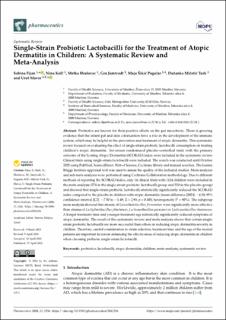Single-Strain Probiotic Lactobacilli for the Treatment of Atopic Dermatitis in Children: A Systematic Review and Meta-Analysis
Fijan, Sabina; Kolč, Nina; Hrašovec, Metka; Jamtvedt, Gro; Pogačar, Maja Šikić; Mičetić Turk, Dušanka; Maver, Uroš
Peer reviewed, Journal article
Published version
Permanent lenke
https://hdl.handle.net/11250/3116141Utgivelsesdato
2023Metadata
Vis full innførselSamlinger
Sammendrag
Probiotics are known for their positive effects on the gut microbiota. There is growing evidence that the infant gut and skin colonization have a role in the development of the immune system, which may be helpful in the prevention and treatment of atopic dermatitis. This systematic review focused on evaluating the effect of single-strain probiotic lactobacilli consumption on treating children’s atopic dermatitis. Seventeen randomized placebo-controlled trials with the primary outcome of the Scoring Atopic Dermatitis (SCORAD) index were included in the systematic review. Clinical trials using single-strain lactobacilli were included. The search was conducted until October 2022 using PubMed, ScienceDirect, Web of Science, Cochrane library and manual searches. The Joanna Briggs Institute appraisal tool was used to assess the quality of the included studies. Meta-analyses and sub meta-analyses were performed using Cochrane Collaboration methodology. Due to different methods of reporting the SCORAD index, only 14 clinical trials with 1124 children were included in the meta-analysis (574 in the single-strain probiotic lactobacilli group and 550 in the placebo group) and showed that single-strain probiotic lactobacilli statistically significantly reduced the SCORAD index compared to the placebo in children with atopic dermatitis (mean difference [MD]: −4.50; 95% confidence interval [CI]: −7.50 to −1.49; Z = 2.93; p = 0.003; heterogeneity I2 = 90%). The subgroup meta-analysis showed that strains of Limosilactobacillus fermentum were significantly more effective than strains of Lactiplantibacillus plantarum, Lacticaseibacillus paracasei or Lacticaseibacillus rhamnosus. A longer treatment time and younger treatment age statistically significantly reduced symptoms of atopic dermatitis. The result of this systematic review and meta-analysis shows that certain single- strain probiotic lactobacilli are more successful than others in reducing atopic dermatitis severity in children. Therefore, careful consideration to strain selection, treatment time and the age of the treated patients are important factors in enhancing the effectiveness of reducing atopic dermatitis in children when choosing probiotic single-strain lactobacilli.

